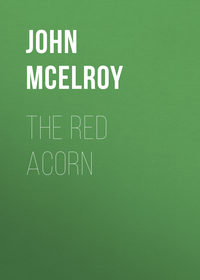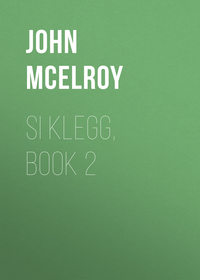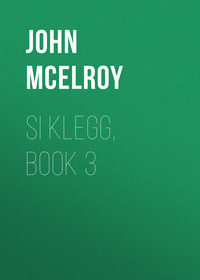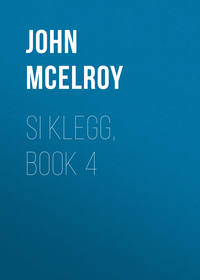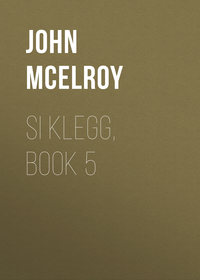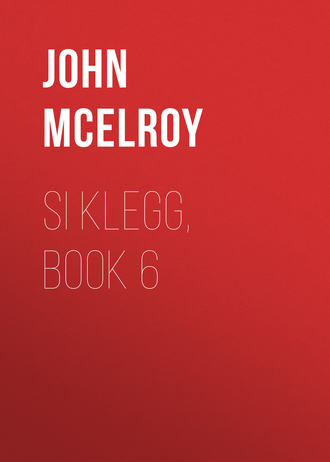 полная версия
полная версияSi Klegg, Book 6
Everything had become quite still all around during this dialog.
"Give us a song," said the rebel, and his comrades' heads began showing over the edge of the rock.
"Now, no rock-throwing and no shootin' while he's singing'," said Shorty. "Give the boy a chance to git back to his tree after he's done."
"All right. We'll play fair. But no politics," came back from the rock.
"Go out there, Alf, on the gravel, and sing to 'em," said Shorty.
Alf Russell hesitated a moment, and then climbed up on the pile of washings and after clearing his throat, sang "When This Cruel War is Over" in his best style, and was applauded from the top of the rock and below.
"Now, give us your speech. But no politics," the rebels shouted.
Monty Scruggs stepped up on the mound and recited "Bingen on the Rhine" in his best school-exhibition style. The delight of the rebels was boundless.
"Hip-hip—Hooray! Good! Good!" they shouted. "Give us another."
Monty scratched his head to think of something appropriate, and then occurred to him Webster's great speech in defense of the Union, which was then a favorite in the schools.
"When my eyes shall be turned to behold for the last time the sun in heaven, may I not see him shining on the broken and dishonored fragments of a once glorious Union; on States dissevered, discordant, belligerent; on a land rent with civil feuds, or drenched, it may be, with fraternal blood. Liberty and Union, now and forever, one and inseparable."
The rebels listened with growing impatience to the words, and as Monty concluded with his best flourish they yelled angrily:
"Heah, we told you no politics. Git back thar, now, quick, or we'll bust your haid with this heah rock."
Shorty and Si raised their guns to shoot the man with the bowlder, and Monty skipped back to the shelter of his tree, saying with a grin:
"I was bound to give 'em a little straight goods before I quit, and they got it. Old Dan Webster's very words."
"The orders is to stay right here for the night," said the Orderly-Sergeant, coming up through the brush to Si, "and be ready for anything that comes. I don't know what old Sherman means—whether he is going to send over some balloons to lift us to the top of the rocks, or set us to tunneling through. I suppose it ain't my business to know. I've got enough to do running this company. But something's got to bust inside the next 24 hours, and when it does there'll be the dumbedest smash this country ever saw. Stay where you are till further orders, and make yourselves as comfortable as possible."
The rebels on the rocks having quieted down, the boys stowed themselves around the roots of the trees, made little fires under the shelter of the rocks, cooked their suppers, smoked their pipes, and finally rolled themselves in their blankets and went to sleep.
Little Pete "snugged" in with Shorty, but when that gentleman was awakened by Si a little after daylight, Pete was gone.
Shorty fumed around at this while he was cooking his breakfast, for he wanted Pete to be there and eat heartily, in preparation for the arduous struggles of the momentous day which was breaking for them.
But little Pete continued to be absent. No one had seen him, no one had heard his voice, no one know anything about him. Shorty became greatly worried, and the others shared his feelings, and began beating up the woods around in search of some place that he might have fallen into.
With the daybreak the firing away to the left, where a lodgment had been made on Rocky Face Ridge, beyond the gap, broke out afresh, and rolled down toward the gap. The squad listened intently to it as it came nearer, for they felt that it meant the beginning of the day's bloody business. The crests above them remained silent.
Suddenly they heard little Pete's voice calling:
"Sergeant Klegg! Corporal Elliott!"
They looked in every direction, but could see no Pete.
"Sergeant Klegg! Corporal Elliott! Look up here. I'm up here on the rocks."
They turned their eyes to the crest, and there saw Pete waving his hat to them.
"Come up here," he called. "There ain't no rebels up here. They've all gone off down into the valley."
From their tense hearts the boys sent up a cheer, which drew all attention to them. The news quickly spread along the line, and was received with cheers.
"Go down that way about 100 yards," Pete called down, "and you'll find a tall pine blowed down agin the cliff. You kin climb that, and git up to where its top lays right agin a bunch of bushes. Shorty rolled on my leg this morning, and waked me up before daylight. I then thought I'd git up and take a look, and see how things appeared before they got to shooting. I found the pine tree, and dumb it mighty quiet, intending to sneak up close to the rebels. But I couldn't find none. They was all gone."
CHAPTER XVI. THE 200TH IND. ASSAULTS THE REBEL WORKS AT DAYBREAK
THERE were the same perplexing sounds of battle in many places and directions when the 200th Ind. went into line as there had been around Buzzard Roost.
Joe Johnston was fiercely contesting every hilltop and narrow gorge to gain time to adjust his army to the unexpected movement through Snake Creek Gap, and save the stores he had accumulated behind the heavy fortifications around Dalton.
Though they had felt themselves completely worn out by the work with the train, the prospect of a fight put new life into the 200th Ind., and they leaned on their guns and listened to the crackling of musketry and booming of artillery far away to their left, to their right, and apparently in their rear. Sometimes the sounds would come so near that the wave of battle would seem to be surely rolling down on them. Then they would clutch their guns more firmly, and their hands instinctively seek their cartridge-boxes. Then the firing would as inexplicably die down and stop, when they would again sink on the ground with fatigue.
So the late afternoon wore on. It grew very quiet all around. Even the dull booming of the cannon far up the valley where Howard and Schofield were advancing on the heavy works immediately in front of Dalton, died down into sullen fitfulness.
The silence of the woods and the mountains as night drew on became more oppressive than the crashing sounds, the feverish movements, and the strained expectancy of the day had been.
The whip-poor-wills began to fill the evening air with their mournful calls, which accentuated and intensified the weird loneliness of the scene, where but a little while before there had been no thought but of deadly hatred and bitter strife.
"I never heard the whip-poor-wills whip so gloomily," remarked the sentimental Alf Russell, after the regiment had stacked arms, and the men were resting, exhausted and out of temper, on the ground. "Seems to me it sounds altogether different from the way they do at home; got something savage in it."
"Probably they're yelling their satisfaction over the number of men they've seen killed and wounded today," ventured Monty Scruggs. "Does 'em good to see men shooting at one another instead of birds."
"Dumbed little brutes," grumbled Shorty, nursing his hurt foot, "if they'd bin wrastlin' all day with a mule train they'd be too tired to go yellin' around like that. I always did hate a whip-poor-will, anyway. They hain't got sense enough to do anything but yell, jest like a pasel o' rebel cavalry."
"Great Scott! I wisht I knowed whether we're goin' to stay here tonight," said Si, handling his blanket roll with a look of anticipation.
"No," said the Orderly, coming down from the right of the regiment. "We're to move forward about a mile, and establish a line for the rest of the brigade to form on. We're to go quietly, without noise or commands, and then bivouac without fires. Get your guns and fall in quietly."
As ill-tempered as tired, the boys roused up from the ground, and began taking their guns from the stacks. Harry Joslin snatched his out first, and the stack, falling over, the bayonet points struck Gid Mackall's face. The angry Gid responded with a blow landed on the side of Harry's head. In an instant the two clinched, and the others, who were in no better humor, began striking at one another in blind temper. Si and Shorty snatched the two principals apart with a good deal of violence and much show of their own tempers.
"You long legged sand hill crane," said Si, shaking Gid. "Will you always be kickin' up a rumpus? I'll break your neck if you don't act better."
"You senseless little bantam," said Shorty, with his grip on Harry's throat; "will you always be raising a ruction? Will I have to wring your neck to learn you to behave?"
"Let him alone, Shorty," said Si irritably. "He ain't to blame. This gangling fly-up the crick started it." And he gave Gid another shake.
"You let him alone. Si," said Shorty crossly. "I know better. This whelp started it, as he always does. I'll throw him down and tramp on him."
"You won't do nothin' o' the kind. Shorty. Don't you contradict me. Let him go, I tell you."
"You take your hands off that boy, or I'll make you, Si Klegg," said Shorty hotly. "I won't see you imposin' on somebody's that's smaller'n you."
The spectacle of the two partners quarreling startled them all. They stopped and looked aghast.
"Here, what's all this disorder here," said the Orderly, coming up, impetuously, and as cross as any one. "Why don't you get into line as ordered? Sergeant Klegg, you're always making trouble for me."
"I ain't doin' nothing o' the kind. What's the sense o' your sayin' sich a thing?" Si retorted. "You know it ain't true."
"Si Klegg, be careful how you call me a liar," answered the Orderly. "I'll—"
"What in the world does all this mean?" said Capt. McGillicuddy angrily, as he stepped back to them. "What are you wasting time squabbling before the men for? Fall into your places at once, and don't let me hear another word from any of you. Don't you see the regiment is moving?"
"We'll finish this later," the Orderly whispered to Si, as he went to his place on the right.
"I'll settle with you, Shorty, when I have more time," Si remarked as he took his place.
"The sooner the better," grunted Shorty. "You can't run over me, if you are a Sergeant."
The wearied men went stumbling along the rough road for what seemed the longest mile ever known. It had grown very dark. At last a form separated itself from the bank of blackness on the left, and a voice said in a penetrating whisper:
"Is this the 200th Ind?"
"Yes," answered the Colonel.
"I'm Lieut. Snowden, of the General's staff," said the whisper.
"Yes; I recognize your voice," answered the Colonel.
"I was sent here," continued the Whisper, "to post you when you came up. You will make this your right, and form out there to the left. Do it without the slightest noise. There is a strong force of rebels out there in front. They have a line of works with abatis in front, and a fort on the hill there to the right, as you can see by looking up against the sky. You will not allow any fires to be made or lights to be shown. The other regiments will come up and form on your right and left, and you will be ready to attack and carry the line immediately in front of you the moment that it is light enough to see to move. The signal will be given by the headquarters bugle."
"Very good," replied the Colonel. "Tell the General that we'll be ready, and he'll find us inside the rebel line five minutes after the bugle sounds."
"In the meanwhile," continue the Aid, "you will keep a sharp lookout. You may be attacked, and if you see signs of evacuation you are to attack, and the other regiments will support you. The General will come up later and give you further instructions. Good night."
The men nearest the Colonel heard plainly all that was said, and it was soon known throughout the regiment. The men seemed to forget their fatigue as they moved alertly but warily into line to the left, and studied intently the sky-line of the rising ground in front.
The whip-poor-wills were still calling, but at the flanks and rear of the regiment. None of them called in front.
"It's full o' rebels over there; that's the reason," said Si to himself, as he noted this. "Yes, they're all at home, and goin' to shoot," he added in a loud whisper. "Lay down, everybody."
He was none too soon. The tramping through the bushes, and the various noises that bodies of men will make when in motion, had reached the ears of the alert rebels. A dazzling series of flashes ran along the sky-line, and a flight of bullets sang wickedly over the heads of the 200th Ind., striking in the bushes and trees far behind them.
"Don't anybody yell! Don't anybody shoot!" called the Colonel in a loud whisper, and it was repeated by the line oflficers. "It will reveal our position. Lie down and keep perfectly quiet. They're overshooting us."
The rebel battery in the fort waked up, and, more to show its good will than anything else, began shelling the surrounding landscape.
One of our batteries, a mile or so to the rear, which had not had an opportunity to fire during the day, could not resist this challenge, and began throwing shells at the fort with so fair an aim as to draw the attention of the rebel battery to it.
The lurid flashes of the muskets, cannon, and shells revealed a belt of jagged abatis several rods wide covering the entire front of the fort and breastworks.
"Great Scott!" muttered Si to himself, for he was not on speaking terms with Shorty, and would not alarm the boys; "there's a porcupine nest to git through. How in the Nation are we ever goin' to do it?"
"Unroll your blankets and lie down on them," came down the line from the Colonel. "Lay your guns beside you. Don't attempt to stack them. You may attract the attention of the rebels. Everybody keep his place, and be ready to form and move at once."
"Stop firing. What are you shooting at?" said a voice of authority in the rebel works. "Who gave the order to fire?"
"The men began it themselves," said a second voice. "They heard Yankees moving over there, and commenced shooting at them."
"How do you know there are any Yankees out there? I don't believe they have advanced beyond the crest of the hill. I think they are all going down toward Resaca. Haven't you any pickets out there?"
"No. We only moved in here this afternoon, and did not know how long we were going to stay. I was ordered to stay here till further orders, to protect the road beyond."
"Well, we haven't any ammunition to waste firing at uncertainties. There's enough Yankees in sight all the time for all the bullets we have, without wasting any on imaginary ones. It'll be time enough for you to begin shooting when you see them coming to the edge of the abatis there. Before they get through that you'll have time enough to shoot away all the ammunition you have."
"I'm going to see whether there are any Yankees there," said the second voice in the rebel works.
"Jim, you and Joe go down to the edge of the abatis and see what you can see."
The wearied boys had nearly all fallen asleep on their blankets. Even the noisy artillery duel had not kept Jim Humphreys awake, and Monty Scruggs and Alf Russell followed his example soon after the firing ceased. Then Harry Joslyn and Gid Mackall, spreading their blankets apart for the first time since they had been in the service, sought rest from their fatigue and forgetfulness of their mutual anger. Si and Shorty kept sternly apart. Shorty occupied himself in fixing the blankets comfortably for a nest for little Pete Skidmore, while Si, brooding over the way that Shorty "had flared up about nothin' at all," and the Orderly-Sergeant's and Capt. McGillicuddy's unjust heat to him, had kept his eyes fixed on the skyline beyond, and had listened to the conversation of the rebel officers. It occurred to him that by watching the two rebels come down he might get an idea of a passage through the abatis, which would be useful in the morning. He strained his eyes to catch sight of their movements.
He saw two projections against the sky-line, which he knew were the men crossing the works. They separated, and he could make out two black blotches above the level of darkness and moving down the slope. One came almost directly toward him, the other going to the left. It occurred to him to capture one of the men. He would have suggested to Shorty to get the other, but he could not bring himself to speak to his partner. Keeping his eyes fixed on the man directly in front, he slowly wriggled forward without rising. The man was evidently coming cautiously, halting every few steps, and looking and listening.
Perfect quiet reigned in the regiment. The men were mostly asleep. Those who were awake were intently watching the hill for some sign of the enemy, or as silently foreboding the happenings of the morrow.
Without making the least noise, Si reached the edge of the abatis. There a young tulip tree had been left standing, and its plentiful branches and large leaves made a thick mass of darkness. He rose upright behind, but his foot came down on a dead stick, which broke with a sharp crack. All the blood rushed to his heart. But at the same instant his head had disturbed a whip-poor-will who had taken refuge there from the noise. She flew away with a tumult of plaintive "whips." The rebel in front halted for a long time. Then he apparently concluded that an owl was after the whip-poor-will, and, reassured, came forward.
As he had crawled along. Si had felt with his hands that he was on a tolerably beaten path, which ran by the sapling he was now standing behind. He was sure that this led through the abatis, and the rebel was coming down it. The rebel came on so near that Si could hear his breathing, and Si feared he could hear his. The rebel was carrying his gun at a trail in his right hand, and putting all his powers into his eyes and ears to detect signs of the presence of Yankees. He hesitated for a little while before the sapling, and then stepped past it.
As he did so Si shot out his right arm and caught him around the neck with so quick and tight a hug that the rebel could not open his mouth to yell. Si raised his arm so as to press the rebel's jaws together, and with his left hand reached for his gun. The rebel swayed and struggled, but the slender Southerner was no match for the broad-shouldered Indiana boy, whose muscles had been knit by hard work.
The struggle was only momentary until Si secured the gun, and the rebel's muscles relaxed from the stoppage of his breath.
"If you say a word, or try to, you're a dead man," Si whispered, as he dropped the gun, and substituted his left hand at the man's throat for his right arm. Taking silence for acquiescence, Si picked up his own gun and started with his prisoner for the Colonel. He walked upright boldly now, for the watchers on the rebel works could not see that there was more than one man in the path.
The Colonel ordered Si to bring his prisoner back into a gully some distance behind the line, where he could be interrogated without the sound reaching the men in the works.
"Where do you belong?" asked the Colonel.
"To Kunnel Wheatstone's Jawjy rijimint."
"How many men have you got over there in the works."
"Well, a right smart passul."
"What do you mean by a right smart parcel?"
"Well, a good big heap."
"What, a thousand?"
"Yes, I reckon so."
"Ten thousand?"
"I 'spects so."
"Twenty thousand."
"Mouty likely."
"You don't seem to have a clear idea of numbers. How many regiments have you got over there?"
"Well, thar's Kunnel Wheatstone's Jawjy rijimint—that's mine; then thar's Kunnel Tarrant's South Carliny rijimint, and then thar's Kunnel Bird's Tennessee rijimint, and I don't mind how many others. They've bin comin' and goin' all day, and I hain't paid no attention to 'em. I only know that thar's enough to give yo'uns a wallopin' if yo'uns only come on."
"Sergeant," said the Colonel, "you did a splendid thing in capturing this man and bringing him to me, but I fear I shall not get as much information out of him as I'd like to. I don't presume anybody really knows just how many men are over there. We've got to jump the works and take the chances on what we find."
"We're ready the minute you give the word. Colonel," said Si, saluting.
"Colonel," said Shorty's voice out of the darkness, "I've brung you one o' the rebel scouts that was piroutin' out there. I don't know as you kin make much out o' him, though, for the welt I fetched him with my gun bar'l seems to've throwed his thinkery out o' gear, and he can't talk straight."
"And so you got the other one," Si started to say to his partner, but then he remembered Shorty's "flarin' up," and held his tongue.
"I don't imagine that his 'thinkery,' as you call it, was of much account when it was in order, if it was no better than this other man's," said the Colonel, with a smile. "Perhaps, if he could think better he wouldn't be in the rebel army. Sergeant (to the Provost-Sergeant), take charge of these two men. Give them something to eat, and send them to Division Headquarters."
Si and Shorty carefully avoided one another on their way back to the company, and declined to discuss their exploits with either the Orderly-Sergeant or Capt. McGillicuddy.
"Go out and git you a rebel for yourself, if you want to know about 'em," Shorty had snapped at the Orderly. "There's plenty more up there on the hill. It's full of 'em."
As everything now seemed quiet in front, the two partners sat down with their back against trees to catch a little sleep before the momentous movement in the morning.
It seemed to Si that he had hardly closed his eyes when the Orderly shook him and whispered an order to help arouse the men and get them into line.
"Don't make the least noise," whispered the Orderly. "I hear the rebels moving around, but we want to jump 'em before they know we're up. The further we can get through that abatis before they discover us, the fewer we'll have killed. It's going to be mighty tough work at best, and I wish that we were going over the works now."
It was the chill gray of the morning, when every man's spirits and courage are at ebb-tide. For an instant, Si felt his heart sink at the thought of the awful ordeal that confronted them. There came across his mind a swift vision of the peaceful home back in Indiana, with the pleasant fields lying about, over which he used to go on sweet Spring mornings like this and note the flowers that had bloomed over night, and the growth the wheat had made. How sickening to be now starting to open up a hell of pain, wounds, and death. Then his natural courage and will reasserted themselves, and he began rousing the boys, but with a tenderness born of the thought that their hearts would be as low as his in that bleak hour.
Jim Humphreys waked up stolidly, and without a word began preparing to fall in. Alf Russell's and Monty Scruggs's faces turned ashy after they had fairly awakened, and they picked up their guns with nerveless fingers.
Harry Joslyn took the position of a soldier, with his gun at an order, his lips tightly closed, and his eyes fixed on the rebel position, as the spreading light developed it. Sandy Baker fidgeted about at one time tinkering with his gun and equipments, and then stopping half-way in the task he had started and falling into a fit of musing. Little Pete Skidmore wandered about, looking into Si's and Shorty's grave faces, and then into others equally solemn, and finding no comfort in any. It was the first time that he heard no joke or quip flash along the forming line to bring cheers or laughter.
"Come, boys," said Si, kindly, "eat your breakfasts. You can't make no coffee nor fry no meat, but you'd better fill up on cold grub. You'll need all you can eat."
The mention of something to eat seemed to remind Gid Mackall of his usual appetite. He pulled a cracker out of his haversack and bit it, but it seemed distasteful, and he spat the piece out.
"The orders are," said the Orderly-Sergeant in a low tone, as he passed down in front of the company, "to strip off your bankets, canteens, and haversacks, and pile them. They'll be in the road in the rush, and catch in going through the abatis."
"Orderly," said Shorty in his most conciliatory way, "if you want to do me a favor make Pete Skidmore one of the detail."



